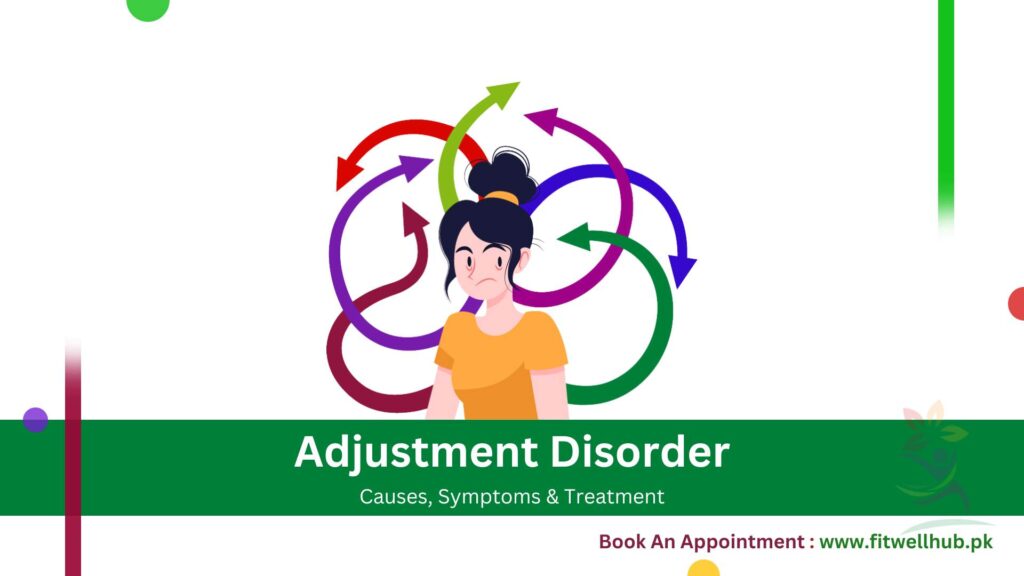Adjustment disorder associated with anxiety is a widespread mental health condition that occurs when an individual tries to adjust to a severe life change or an unpleasant incident. Other anxiety disorders and conditions like bipolar disorder are usually chronic and persistent, while particular events generally stimulate adjustment disorders, which can be treated with prompt care and proper support. By having enough knowledge about symptoms, causes, and treatments, one can control their mental well-being during any stressful change.
Quick Links
ToggleSymptoms
The following emotional and physical symptoms are observed in individuals suffering from adjustment disorders.
- Continuous feelings of sorrow, disappointment, or depression
- Feeling worried, anxious, or nervous
- Consistent mood swings, Irritability, or emotional outbursts
- Feeling difficulty in focusing or making decisions
- Insomnia or disturbance in sleeping patterns
- Feeling tired or low energy levels
- Physical symptoms include headache, gastrointestinal issues, or muscle stretching
- Cut off from relationships and other social meetups and gatherings
- Difficulty in performing daily life activities, such as at work or school
These symptoms may vary greatly depending upon the duration and severity and it’s important to note that these are a natural response to the difficulties that are faced during times of stressful change.
GET IN TOUCH
Book An Appointment
When to See a Doctor
There are the following key symptoms that indicate it’s time to see a medical doctor:
- Having symptoms that last for more than a month
- If persistent symptoms disturb the ability to work, study, or maintain relationships
- Suicidal or self-damaging thoughts
- Continuous disturbance in sleep, appetite, or energy levels
- Unable to control behaviors or emotions
Causes
There is a wide range of different stressful life events and changes that can stimulate adjustment disorders:
- Starting a new job, moving to a new home, getting married or divorced, retiring from a career, or experiencing the loss of a loved one are major life-changing events that can stimulate adjustment disorder.
- Some natural disasters, serious illnesses, accidents, or facing violence or abuse are also traumatic events.
- Conflicts with family members or friends, the end of a close relationship, or the birth of a child.
- There are some academic or professional challenges like struggling with academic performance, facing job loss or career changes, or dealing with workplace stress that can stimulate adjustment disorder.
- Adjustment disorders with anxiety also process and respond to the change when an individual’s responding and coping mechanisms are overloaded.
Risk Factors of Adjustment Disorders
Although adjustment disorders with anxiety can affect anyone some key factors increase the vulnerability of individuals for disease attack.
- Previous mental health conditions: If an Individual is already suffering from mental problems like depression, anxiety, or any other mental health challenge may become more susceptible to developing adjustment disorders.
- Lack of social support: There are a lot of people who lack family, friends, or community support therefore it becomes difficult for them to cope with life changes and stressors alone.
- Stressful life events: Individuals who are already experiencing any ongoing stressful life events are more susceptible to adjustment disorders.
- Personality traits: Some personality traits, like perfectionism or a tendency towards anxiety, also play a role in developing adjustment disorders.
- Genetic factors: According to research certain genetic factors also contribute towards the development of adjustment disorders.
Complications
If adjustment disorders with anxiety are left untreated can cause several complications:
- Worsening of symptoms: If adjustment disorders are not properly treated, then their emotional and physical symptoms become severe and increase distress and disturbance in daily life routines.
- Development of other mental health conditions: Untreated adjustment disorders can also increase the risk of severe mental health conditions, like substance abuse, depression, post-traumatic stress disorder (PTSD), etc.
- Impaired relationships and social functioning: The emotional and behavioral changes due to adjustment disorders can affect personal and professional relationships, and can cause isolation and distress.
- Decreased productivity and work performance: Adjustment disorder can also affect the productivity of individuals. It causes difficulty concentrating, lack of motivation, and emotional instability, which can badly influence an individual’s ability to perform in academic settings or at work.
- Physical health issues: Adjustment disorders with anxiety and stress can also lead to physical health problems, like gastrointestinal issues, cardiovascular disease, or weak immune function.
Prevention
Though all life events and changes that stimulate adjustment disorders, cannot be completely controlled, by following certain steps their effects can be reduced.
Strong Support Network
Individuals should develop strong relationships with family, friends, and community members so, that they can console them and provide them emotional support during their stress.
Stress Management Techniques
Taking regular exercise, and following relaxation techniques can also manage physical and emotional anxiety.
Healthy Lifestyle
The use of a balanced diet, proper sleep, and regular physical activities can also support overall well-being and adaptability.
Diagnosing
The diagnostic process may include:
| Diagnostic Step | Description |
|---|---|
| Clinical Interview | The mental health professional will interview you to gather more information about your symptoms, life events, and their effects on daily functioning. |
| Psychological Assessment | Various psychological tests and questionnaires are conducted to determine the severity of symptoms and identify any other mental health conditions. |
| Medical Evaluation | Physical tests may be prescribed to ensure that symptoms are not due to an underlying medical condition. |
| Diagnostic Criteria | Your symptoms are assessed against the DSM-5 diagnostic criteria for adjustment disorders with anxiety by a mental health specialist. |
| Treatment Planning | Based on your symptoms and their impact on daily life, mental health experts will develop a personalized treatment plan to address your needs and enhance your mental well-being. |
Your symptoms and their impact on your daily activities play a key role in diagnosing adjustment disorders. Mental health experts will create a custom treatment plan to address your specific needs and boost your mental well-being.
Treatment Plans
Treatment plans for adjustment disorders include a combination of various therapies and medicine. The choice of suitable treatment plans depends on how severe your symptoms are, what are root causes, what you need, and what you prefer. The most commonly used treatment plans are:
- Psychotherapy: Cognitive-behavioral therapy (CBT) is a popular and commonly used effective form of psychotherapy for adjustment disorders. By this therapy, you can detect and challenge your negative thought patterns, develop coping strategies, and build resilience.
- Counseling: Counselling is a necessary part of treatment plans to create a supportive environment. It allows you to share your feelings, learn how to handle stress, and build better ways to combat it.
- Medication: Doctors prescribe medicines to help with adjustment disorders that cause anxiety. These medicines include anti-anxiety pills or antidepressants to reduce symptoms.
- Lifestyle modifications: Adopting stress-reducing activities, like exercise, relaxation techniques, and social support, can enhance therapeutic interventions and promote overall health.
- Support groups: By joining a support group you can get a sense of community, validation, and different experiences and insights. It will be helpful during the adjustment process.
Medications
In some cases, medication is also prescribed to treat adjustment disorders with anxiety. Commonly used medicines for the treatment of adjustment disorders with anxiety are:
- Antidepressants: Usually selective serotonin reuptake inhibitors (SSRIs) and serotonin-norepinephrine reuptake inhibitors (SNRIs) are used as the first-line medication for adjustment disorders with anxiety. Its examples are venlafaxine (Effexor), fluoxetine (Prozac), and sertraline (Zoloft).
- Anti-anxiety medications: To get short-term relief of anxiety symptoms Benzodiazepines, such as alprazolam (Xanax) or lorazepam (Ativan), are prescribed. But generally, these are not recommended for long-term use due to the risk of dependence.
- Mood stabilizers: These drugs help control emotional reactions and manage symptoms of adjustment disorders with anxiety. Some examples are valproic acid (Depakote) or lamotrigine (Lamictal).
- Medication: Medication works best when used along with other treatments such as talk therapy, to tackle the root causes of adjustment disorder and boost mental health for the long haul.
GET IN TOUCH
Book An Appointment
Frequently Ask Questions(FAQ’s)
Anxiety disorder is a long-term mental health issue that results from ongoing feelings of worry and fear which disturb daily life. Adjustment disorder happens because of stressful events or life changes that can cause emotional and behavioral problems.
The Diagnostic and Statistical Manual of Mental Disorders (DSM-5) classifies adjustment disorders as specific types of mental health issues that big life events or changes trigger.
Adjustment disorders stick around for six months after their effects start. But different things can change how long an adjustment disorder lasts.
Doctors start treating adjustment disorders with a mix of therapy and short-term medicines. This approach helps spot and shake up negative thinking, come up with ways to cope, and toughen up.
Yes, cognitive-behavioral therapy (CBT) is an effective treatment for adjustment disorders with anxiety. It helps to detect and challenge negative thought patterns, develop coping strategies, and build resilience.














